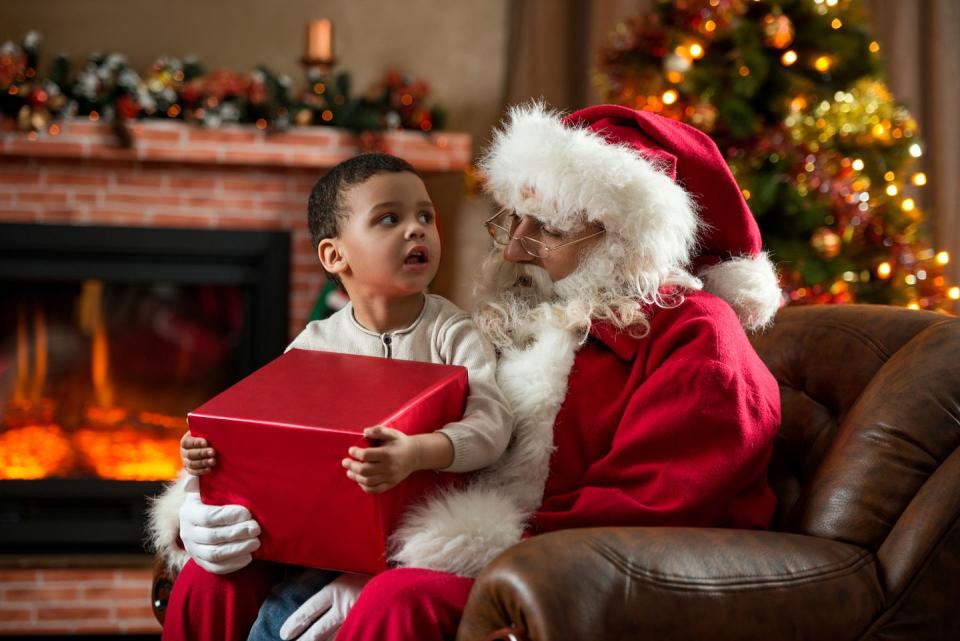Is Santa Claus Real? Here's What to Say When Your Kids Ask
"Hearst Magazines and Yahoo may earn commission or revenue on some items through these links."
From decking the halls to trimming the tree, a lot of work goes into making your home feel magical for the holidays... and chances are, you don't receive any help from the North Pole with your gift shopping and other Christmas responsibilities. If you have little ones in your home, then you know that making all that Christmas magic look effortless can be a challenge. Inevitably, your children will start to question, "Is Santa real?" and when that time comes, you'll want to make sure both you and your kids are prepared for the answer.
"The discussion on Santa does not completely depend on a certain age or level of maturity of a child," Neha Navsaria, Ph.D., child psychologist and associate professor of psychiatry at the Washington University School of Medicine, tells Woman's Day. "It depends more on how a parent responds to their child's reaction — by acknowledging, accepting, and respecting their child’s feelings." According to her, a child who feels heard is far more likely to feel emotionally safe and willing to learn. That said, the answer to whether or not Santa Claus is real may be more complicated than either of you realize.
So, is Santa Claus real?
Santa Claus is real, of course. The New York Sun even reported it back in 1897! Not to mention, Santa has his own hotline and the North American Aerospace Defense Command (NORAD) even tracks his sleigh on Christmas Eve. But the current Santa Claus isn’t from the North Pole. According to an article published in the Washington Post, a man from Long Island legally changed his name to Santa Claus in 2012. After spending years playing the role of Santa at Macy's in New York City, Claus now continues to appear as Santa at community and private events. He told the Washington Post that legally changing his name made the experience a bit more enchanting. When a child asks if he's really Santa, he has the documentation to back it up.
Long before this Santa Claus, though, there was Saint Nicholas. According to historical records, Saint Nicholas was a monk born in the third century in a village called Patara, now part of modern-day Turkey. He was known for his kindness and good deeds, and he eventually became to be known as the protector of children and sailors. After his death, the legend and the magic of Saint Nicholas continued to spread throughout Europe. Eventually, Dutch, Swiss, and German immigrants moved to America and the tradition of Saint Nicholas evolved into the jolly, red-suited Santa Claus we know today.
How to answer questions about Santa Claus

Santa Claus is real in a sense, but if your kids are starting to ask questions about their Elf on the Shelf and the presents under the tree, then it might be time to address the topic head-on. The first step: Put yourself in their shoes. "Children may feel sad, confused, disappointed, or angry," Navsaria says. But no matter how they're feeling, Navsaria notes that you should acknowledge these emotions and let your child know that it is okay to feel that way. This probably won't be the last time your children will experience disillusionment, after all, so think of this conversation as an opportunity.
Navsaria suggests that you begin the conversation by asking your kids why they're beginning to think that Santa might not exist and what that means for them. "They may wonder how one moves forward in celebrating Christmas without a certain sense of magic," explains Navsaria. "However, once a parent has validated their child's emotion, they can show them how to continue the magic in new and different ways." Consider sharing your own experience of finding out about Santa Claus in order to connect with your child so they feel less alone in their sense of grief and loss.
You can also use this conversation as an opportunity to think about what the story and tradition of Santa means to your family, as well as how you can all keep good feelings associated with him alive in the future.

The (Wonderful) Truth About Santa by B. K. Gendron and Jessica Jansen
booksamillion.com
$12.99
booksamillion.comFor example, actress Kristen Bell spoke to Woman's Day in 2019 about how she broached the topic of Santa with her daughter. When her daughter started asking questions about Santa, Bell offered to speak honestly with her, then read her daughter a book called The (Wonderful) Truth About Santa, which teaches kids that anyone can be a Santa Claus by being kind and generous with others, especially during the holiday season.
Keep in mind that, for young children, there can be a blurry line between magic and reality. As Navsaria points out, "the work of a young child is defined by make-believe and fantasy play." According to her, the story of Santa allows parents "to enter their little one's world in a developmentally appropriate way and teach children to exercise their skills in imagination." So if your kids want to keep on believing, let them. Christmas magic only lasts so long, and they should enjoy it while they can!
And for older kids who are ready to face the truth, you can still focus on ways to keep the spirit of Santa going during your family holiday celebrations, like being generous with your time and money and spending time reflecting on your faith — because the magic of Christmastime is still very much real if you believe.
You Might Also Like


